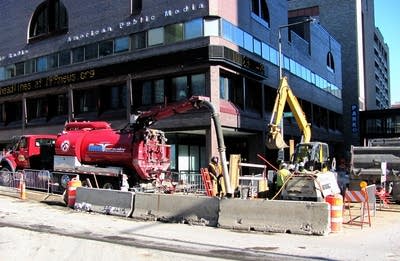Central Corridor project has aggressive goals for women and minority contractors
Go Deeper.
Create an account or log in to save stories.
Like this?
Thanks for liking this story! We have added it to a list of your favorite stories.

The women and minority hiring goals for building the Central Corridor light rail project are substantially higher than state or federal targets.
The Metropolitan Council's goal is that women and minority subcontractors win 15 percent of the Central Corridor work. That's nearly double the goal set by the federal government for public works projects for DBEs, or disadvantaged business enterprises as they are known.
The Central Corridor light rail line will connect downtown Minneapolis with downtown St. Paul, and will take nearly four years to build.
Mark Fuhrmann of the Metropolitan Council says the agency will watch the hiring performance of the prime contractors closely.
Turn Up Your Support
MPR News helps you turn down the noise and build shared understanding. Turn up your support for this public resource and keep trusted journalism accessible to all.
"The primes, with their subs, are required to report monthly in their invoice how they are doing on DBE and workforce participation," said Fuhrmann. "We've begun, and we'll continue for the next four years, to track that."
Central Corridor has the potential to be a big payday for the companies. The project's current pricetag is $957 million, and more than half that amount in contracts have already been awarded to prime contractors.

The Met Council estimates that companies owned by women and minorities might land more than $70 million in subcontract work.
Fuhrmann says the Met Council's goal for hiring individual construction workers is that minorities account for 18 percent of the project's hours, and female workers account for 6 percent.
Goliath Hydra Vac of Lakeville has a Central Corridor project subcontract. It's owned by Rachelle Volk.
One of the Goliath vacuum cleaner trucks is parked near an excavated hole on Cedar Street in downtown St. Paul.
Volk says the vacuum truck removes dirt around utility lines that are being moved for the light rail tracks.
"We've got a high-pressure heated water jetter that cuts through the frost, as we suck it up with the hose that comes off the boom," said Volk.
"The intention will be to use minorities on the job. But before you know it the job is done, and there were no minorities on it."
Volk started Goliath nine years ago. She and her husband took out a second mortgage on their home to buy their first truck. Now the company has six trucks and nine employees.
Goliath has state certification as a Disadvantaged Business Enterprise because it is owned by a woman. That certification puts Goliath on a state list to help draw the attention of prime contractors.
But Volk says she thinks the quality of her company's work, more than the DBE status, is the reason her business is successful.
Minneapolis-based Yaw Construction is another Disadvantaged Business Enterprise that has gotten some Central Corridor work. Gilbert Odonkor, an African American, is the owner.
The company does specialty concrete work, and was also a subcontractor on the 35W bridge project.
Odonkor says he has a master's degree in business and construction management, and worked several years for a major Minneapolis construction company.
Odonkor says if he does a good job on a contract there's a better chance he'll get more work. However, he says hiring goals are still needed to replace what, in the past, were simply good intentions.
"The intention will be there to use minorities on the job," he said. "But before you know it the job is done and there were no minorities on it. So I think holding the generals to a higher standard helps everybody."
Attempts to meet women and minority hiring goals on transportation projects in Minnesota over the past decade have fallen short, sometimes far short, of goals.
Two years ago, a range of groups protested the results and demanded the state do better.
The result was an agreement by state officials to improve women and minority hiring.
The Met Council's Central Corridor project, with its higher than usual hiring goals, is being watched closely to gauge the agency's commitment to the process.
Project manager Mark Furhmann says his agency began recruiting efforts three years ago to tell women and minorities about work opportunities. With the majority of construction still ahead, those outreach efforts are ongoing.
Met Council officials say the light rail project will create 2,500 construction jobs over four years. The agency says already more than 60 companies owned by women and minorities have subcontracts for the project.
A member of the Met Council's oversight committee, which is monitoring compliance, says at this point the prime contractors are meeting their goals.
Dear reader,
Political debates with family or friends can get heated. But what if there was a way to handle them better?
You can learn how to have civil political conversations with our new e-book!
Download our free e-book, Talking Sense: Have Hard Political Conversations, Better, and learn how to talk without the tension.




